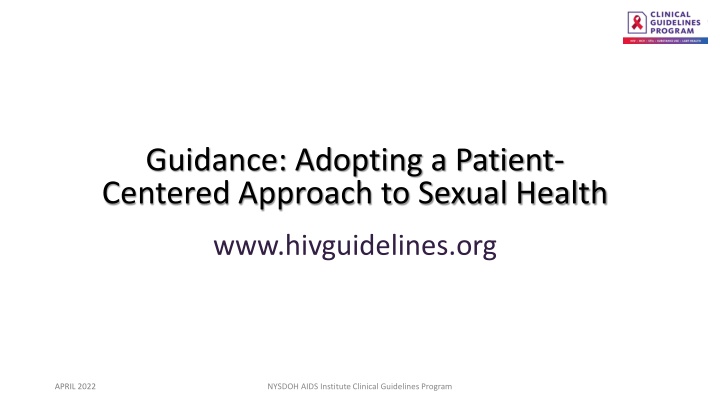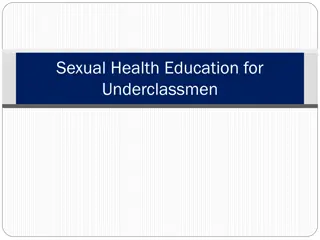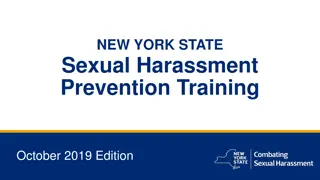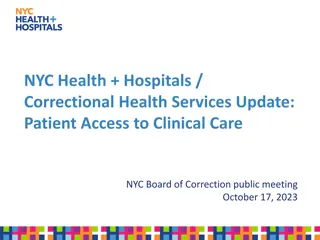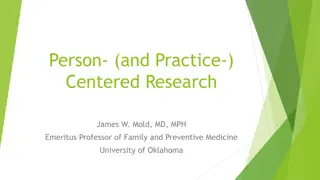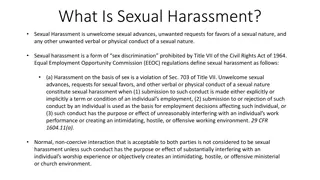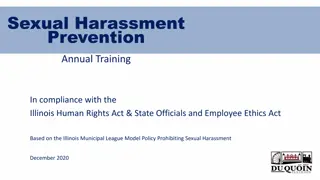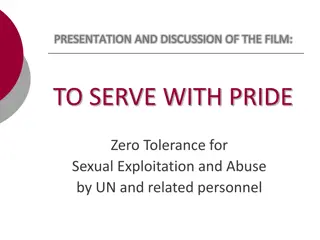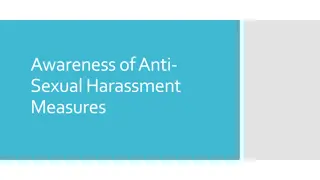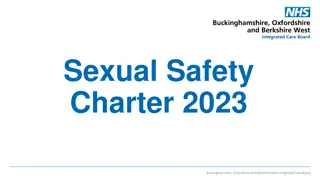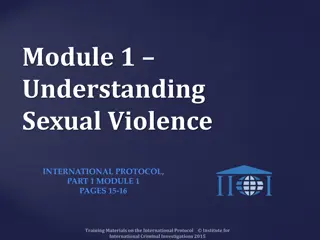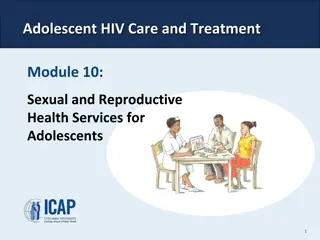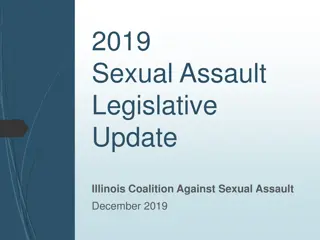Patient-Centered Approach to Sexual Health in New York State
This guidance encourages clinicians to adopt a patient-centered approach to sexual health care, aiming to improve the well-being of individuals in New York State receiving HIV prevention and care services. By recognizing sexual health as vital to overall well-being, promoting empowerment, and addressing barriers to care, the focus is on enhancing patient outcomes and reducing stigma. Inclusive settings, empowerment, wellness, harm reduction, and reproductive health are integral to providing comprehensive sexual health care.
Download Presentation

Please find below an Image/Link to download the presentation.
The content on the website is provided AS IS for your information and personal use only. It may not be sold, licensed, or shared on other websites without obtaining consent from the author.If you encounter any issues during the download, it is possible that the publisher has removed the file from their server.
You are allowed to download the files provided on this website for personal or commercial use, subject to the condition that they are used lawfully. All files are the property of their respective owners.
The content on the website is provided AS IS for your information and personal use only. It may not be sold, licensed, or shared on other websites without obtaining consent from the author.
E N D
Presentation Transcript
Guidance: Adopting a Patient- Centered Approach to Sexual Health www.hivguidelines.org APRIL 2022 NYSDOH AIDS Institute Clinical Guidelines Program
Purpose of This Guidance Purpose of This Guidance Encourage clinicians to adopt a patient-centered approach to sexual health care to improve the health and well-being of people in New York State who receive HIV prevention and care services and prevention and care services related to other STIs Improve patients overall health and well-being, reduce stigma, empower patients, and increase their uptake of sexual health-related resources Recognize sexual health as an important component of overall health that care providers should address as part of routine health visits APRIL 2022 NYSDOH AIDS Institute Clinical Guidelines Program www.hivguidelines.org
Sexual Health Framework Sexual Health Framework Includes ensuring that all people in NYS are empowered to exercise and achieve control over their sexual health and can access sexual health services that promote wellness in a manner that is respectful of their needs. This framework acknowledges sexuality as a life-long endeavor for people of all identities. It recognizes the importance of sexual pleasure, satisfaction, and intimacy to overall health and well- being. --AIDS Institute Director Johanne E. Morne, MS APRIL 2022 NYSDOH AIDS Institute Clinical Guidelines Program www.hivguidelines.org
Multifaceted Patient Multifaceted Patient- - Centered Sexual Centered Sexual Health Care Health Care Sexual health is multifaceted and integral to an adult s health and healthcare throughout their lifespan Facets include: Inclusive setting Empowerment Wellness Harm reduction Reproductive health Information and resources APRIL 2022 NYSDOH AIDS Institute Clinical Guidelines Program www.hivguidelines.org
Inclusive Setting Inclusive Setting Provide a safe, welcoming, and affirming healthcare experience for all patients regardless of their sexual identity, expression, orientation, or experience Approach discussions of sexual health and history in an open and nonjudgmental manner Avoid using stigmatizing language, such as safe sex and high-risk sex Take an HIV status-neutral approach to discussions of sexual health Address structural, racial, socioeconomic, and cultural barriers to sexual health and healthcare APRIL 2022 NYSDOH AIDS Institute Clinical Guidelines Program www.hivguidelines.org
Empowerment Empowerment Refrain from making assumptions based on a patient s age, physical experience, or gender expression Ask patients to identify their preferred pronouns and then ensure use of these pronouns in addressing patients Support patients in identifying their sexual identity, orientation, experience and needs; engage in shared decision-making for care planning Support and encourage patients self-efficacy Provide information that can help reduce stigma and fear, such as information about U=U (undetectable = untransmittable) for patients with HIV Advocate for patients sexual rights, including the right to make sexual health-related decisions APRIL 2022 NYSDOH AIDS Institute Clinical Guidelines Program www.hivguidelines.org
Wellness Wellness Address not just disease prevention and treatment but also barriers to pleasurable sex and options for harm reduction Assist patients in managing the effects of age, chronic disease, disability, or dysfunction that may affect sexual health Recognize that the concerns of patients 50 years old may differ from those of younger patients Screen for erectile dysfunction in patients who may be at risk Provide information and support for patients in achieving intimacy and sexual satisfaction APRIL 2022 NYSDOH AIDS Institute Clinical Guidelines Program www.hivguidelines.org
Harm Reduction Harm Reduction Encourage patients to disclose experiences that may be harmful, including: Condomless sex Drug use Sex with multiple or anonymous partners Transactional sex Help identify and encourage adoption of manageable options for harm reduction Ask open-ended questions about any experience with sexual violence, intimate partner violence, or other types of abuse Assess access to HIV pre-exposure prophylaxis (PrEP) for patients who do not have HIV Link patients to prevention and other services as needed APRIL 2022 NYSDOH AIDS Institute Clinical Guidelines Program www.hivguidelines.org
Reproductive Health Reproductive Health Recognize that reproductive health and services are often central to sexual health for patients Address all aspects of reproductive health, including: Contraceptive choices for all genders Linkage to gynecological and obstetric care, abortion services, and other services as needed Support patients in safely avoiding, achieving, terminating, or carrying a pregnancy to term, such as through: Informed decision-making and protection of patients' rights Education about U=U for patients with HIV who wish to conceive with a serodifferent partner APRIL 2022 NYSDOH AIDS Institute Clinical Guidelines Program www.hivguidelines.org
Information and Resources Information and Resources Ensure accessibility to sexual health-related information and resources in multiple languages and formats to meet diverse needs, including those of patients who: Identify as LGBTQIA+ Are 50 years old Live with chronic disease or disability Engage in transactional sex or sex work Use substances Have experienced trauma Require housing, social services, or other specialized services Have low or no literacy or health literacy Have limited or no computer or internet access Require or prefer receiving information via audio or video APRIL 2022 NYSDOH AIDS Institute Clinical Guidelines Program www.hivguidelines.org
Resources for Care Providers Resources for Care Providers Visit the Adopting a Patient-Centered Approach to Sexual Health guidance for additional resources, including those available from: New York State Department of Health (NYSDOH) and New York City Health Centers for Disease Control and Prevention (CDC) and HIV.gov American Academy of HIV Medicine American Sexual Health Association (ASHA) Gay & Lesbian Medical Association (GLMA) National Coalition for Sexual Health National Institute on Aging National LGBTQIA+ Health Education Center Reproductive Health Access Project and Reproductive Health National Training Center APRIL 2022 NYSDOH AIDS Institute Clinical Guidelines Program www.hivguidelines.org
Need Help? Need Help? NYSDOH AIDS Institute Clinical Guidelines Program www.hivguidelines.org
Access the Guidance Access the Guidance www.hivguidelines.org > Guidance: Adopting a Patient-Centered Approach to Sexual Health Also available: Printable PDF NYSDOH AIDS Institute Clinical Guidelines Program www.hivguidelines.org
